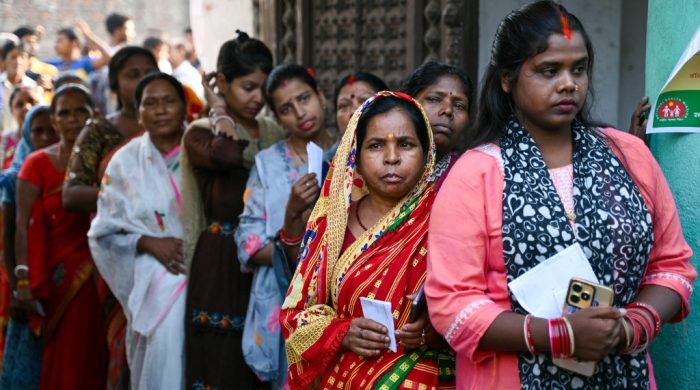Modi’s struggling rivals to vote as India’s election resumes

- Update Time : Saturday, May 25, 2024
- 32 Time View

India’s six-week election resumed on Saturday, with top rivals of Prime Minister Narendra Modi due to vote in the capital New Delhi after accusing him of unjustly targeting them with criminal probes.
Modi, 73, remains roundly popular after a decade in office and his ruling Bharatiya Janata Party (BJP) is widely expected to win a third term next month after a poll hit by recurrent early summer heatwaves.
His prospects have been further bolstered by several criminal investigations into his opponents, sparking concerns from UN rights chief Volker Turk and rights groups over the poll’s fairness.
Delhi Chief Minister Arvind Kejriwal, 55, one of the top members of a disparate cross-party alliance hoping to unseat the BJP, was jailed for weeks this year as part of a long-running graft case.
The Supreme Court bailed Kejriwal earlier this month and he has returned to the campaign trail, urging Indians to vote against what he called a nascent ‘dictatorship’.
‘Modi has started a very dangerous mission,’ he said soon after his release. ‘Modi will send all opposition leaders to jail.’
Kejriwal was set to vote in Delhi, where polls opened at 7 am Saturday (0130 GMT), along with Rahul Gandhi, whose Congress party is spearheading the opposition alliance of more than two-dozen parties competing jointly against Modi.
Gandhi, the scion of a dynasty that dominated Indian politics for decades, and the son, grandson and great-grandson of former prime ministers, was convicted of criminal libel last year after a complaint by a member of Modi’s party.
His two-year prison sentence saw him disqualified from parliament until the verdict was suspended by a higher court.
In February authorities froze several Congress bank accounts as part of a running dispute over income tax returns filed five years ago, a move Gandhi said had severely impacted the party’s ability to contest the election.
‘We have no money to campaign, we cannot support our candidates,’ the 53-year-old told reporters in March.
Modi’s political opponents and international rights campaigners have long sounded the alarm on India’s shrinking democratic space.
US think-tank Freedom House said this year that the BJP had ‘increasingly used government institutions to target political opponents’.
India is voting in seven phases over six weeks to ease the immense logistical burden of staging an election in the world’s most populous country.
Turnout is down several percentage points from the last national poll in 2019, with analysts blaming widespread expectations of a Modi victory as well as hotter-than-average temperatures heading into the Indian summer.
India’s weather bureau this week issued a heatwave ‘red alert’ for Delhi and surrounding states where tens of millions of people will be casting their ballots on Saturday.
Temperatures are forecast to reach 44 degrees Celsius (111 degrees Fahrenheit), with the India Meteorological Department warning of heightened health risks for infants, the elderly and those with chronic diseases.
Extensive scientific research shows climate change is causing heatwaves to become longer, more frequent and more intense, with Asia warming faster than the global average.
More than 968 million people are eligible to vote in the Indian election, with the final round of polling on June 1 and results expected three days later.















